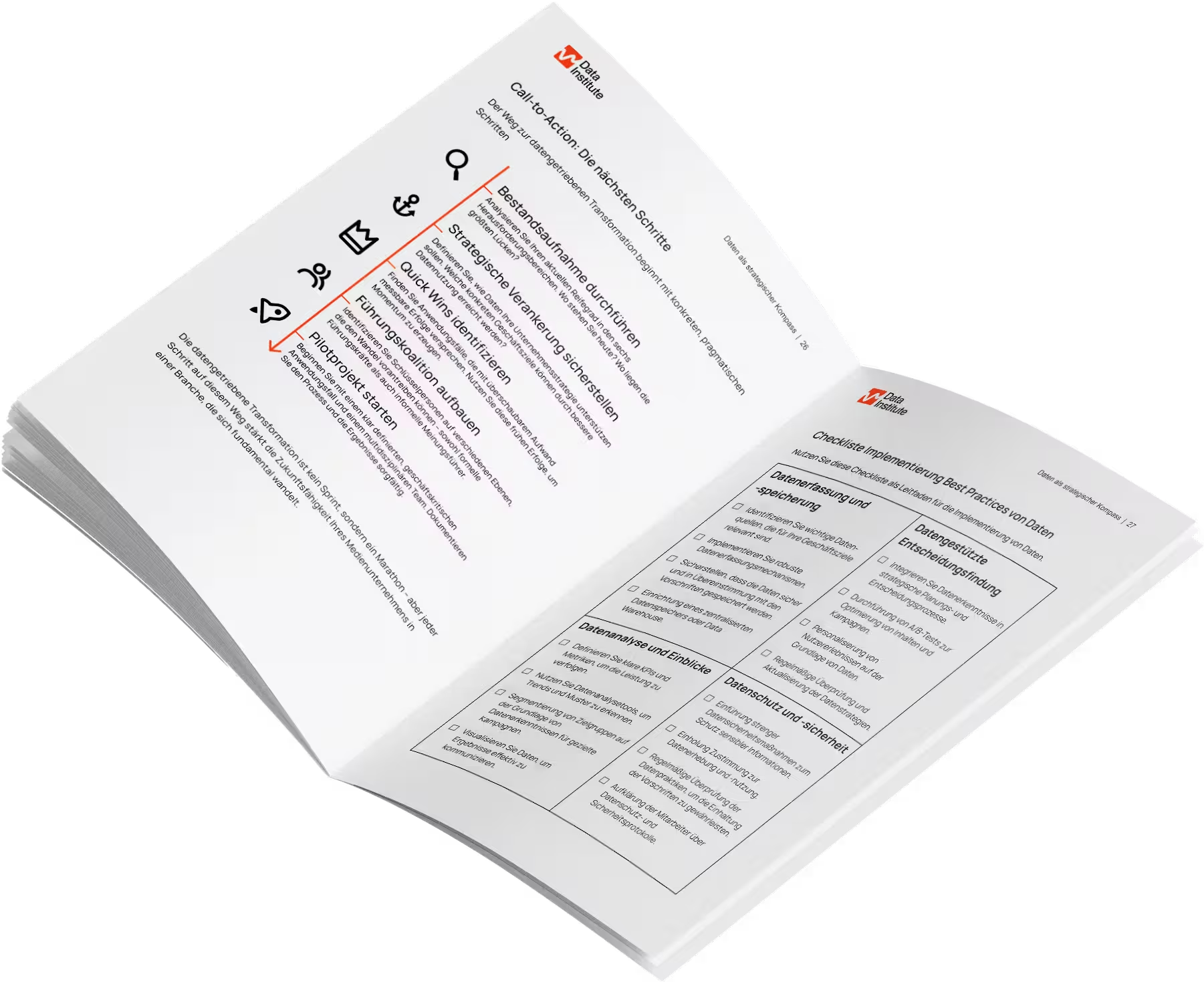AI or AI in companies: opportunities and use cases


The roadmap for data-driven transformation
The ePaper shows you strategies, success stories and a checklist for a direct start into the digital future.

- Das ist eine H2
- Das ist eine H3
What is generative AI?
When the word “generative” comes before that, it describes AI-based systems that can produce results, such as images, video, audio, text, code and much more.
This works by feeding the generative AI models with data and recognizing patterns in this data, from which new, original outputs are then generated.
A well-known example of generative AI is Generative Adversarial Networks (GANs), in which two AI systems work together in a competing process to generate ever more realistic outputs. Generative AI has numerous applications, from generating realistic computer graphics for video games or movies, to creating tailor-made texts for digital assistants, to accelerating scientific discoveries by proposing hypotheses or experiments. This advanced form of AI opens doors to new opportunities, but also faces challenges in terms of ethics and copyright.
How can generative AI be used in companies?
But generative AI is not only suitable for end users, but also offers companies a number of opportunities to automate processes, promote innovation and improve the customer experience.
Content development through generative AI
One of the most obvious uses of Generative AI is the development of texts, images and other content. Thanks to intelligence, these are also tailor-made, e.g. for marketing and advertising purposes. One area of application is the creation of personalized email campaigns or assistance with using social media accounts.
Product Design through Generative AI
Companies can use generative AI to generate new product ideas. These models can analyze various design parameters and suggest new combinations that can result in innovative products.
Generative AI can also help designers gather inspiration.
Using AI in customer service
Generative AI can be used to run chatbots and virtual assistants that answer customer service requests in real time. These models can understand customer inquiries and generate relevant, personalized answers.
Data science and analytics through generative AI — our favorite topic
Generative AI can also be used to generate hypotheses or scenarios for data-driven decision making. These models can identify complex patterns in large amounts of data and make predictions for future trends.
Closing security gaps with generative AI
In cybersecurity, generative AI models can be used to identify anomalies and create proactive defense strategies. They can even simulate how an attacker could act to test and strengthen security systems.
What does machine learning have to do with AI?
Machine learning (also ML) is a central component of artificial intelligence and has contributed to the rapid progress of this field. It is an approach in which computer models learn from sample data and make predictions or decisions based on this data without being explicitly programmed to do so. In other words, machine learning is the process by which AI systems gain the ability to learn from experience. For example, a machine learning model can use data from thousands of images to “learn” what a cat looks like. When the model then sees a new image, it can use its training to predict whether the image shows a cat or not. This process of learning from data and applying what has been learned to new situations is a cornerstone of what we call artificial intelligence.
Using AI in business — the benefits
Companies that use artificial intelligence benefit from a wide range of benefits that can have a significant impact on their business results.
One of the key benefits is increased efficiency and productivity. By automating routine and time-consuming tasks, employees can make better use of their time and focus on more complex and strategically important tasks. Creativity is also promoted by the fact that redundant work is carried out by AI.
In addition, AI enables accurate forecasting and trend analysis, leading to better-informed business decisions. The data-driven company is only really picking up steam thanks to AI!
Companies can also use AI to create personalized customer experiences by responding to individual needs and preferences, which in turn leads to increased customer satisfaction and loyalty.
Finally, risks can be minimized by using AI, for example by identifying fraud attempts at an early stage or avoiding downtime through predictive maintenance.
An AI workshop from The Data Institute — this is how we can support you
Using AI in companies is the path to a long-term competitive advantage. You can save costs, make work easier for employees and ensure that they can focus on new, innovative ideas.
As consultants from The Data Institute, we will accompany you on your journey to an AI-driven company.
This is how an AI workshop from The Data Institute works
In the AI workshop, we first find out exactly what your challenges are and how you are positioned in terms of data. This includes both the level of digitization and the corporate culture, but also the assessment of the IT and data department. This also includes the identification of use cases for the use of AI.
From here, we can derive recommendations for action on how and where the use of generative AI is worthwhile, but also derive concrete steps; from the selection of tools to the training of employees to daily use.
What artificial intelligence has to do with corporate culture
In order to incorporate artificial intelligence into everyday working life, employees often need information and support as to who should use the new tools. AI is therefore a cultural issue.
Neither you nor your employees are helped if you use AI tools in the company that no one wants to deal with — or if AI tools are used that have no positive impact on work performance.
Establishing the culture is a top-down process. In management, there must be acceptance and also the desire to change so that an open culture can be exemplified. We are happy to help you educate and enable everyone responsible to use AI themselves.

Do you want to establish AI in your company?
Let's go!
Do you want to establish AI in your company?
Let's go!

Do you want to establish AI in your company?
Let's go!

Related case studies
There are suitable case studies on this topic
Which services fit this topic?

More news about artificial intelligence?
Available in our newsletter!
More news about artificial intelligence?
Available in our newsletter!

More news about artificial intelligence?
Available in our newsletter!
